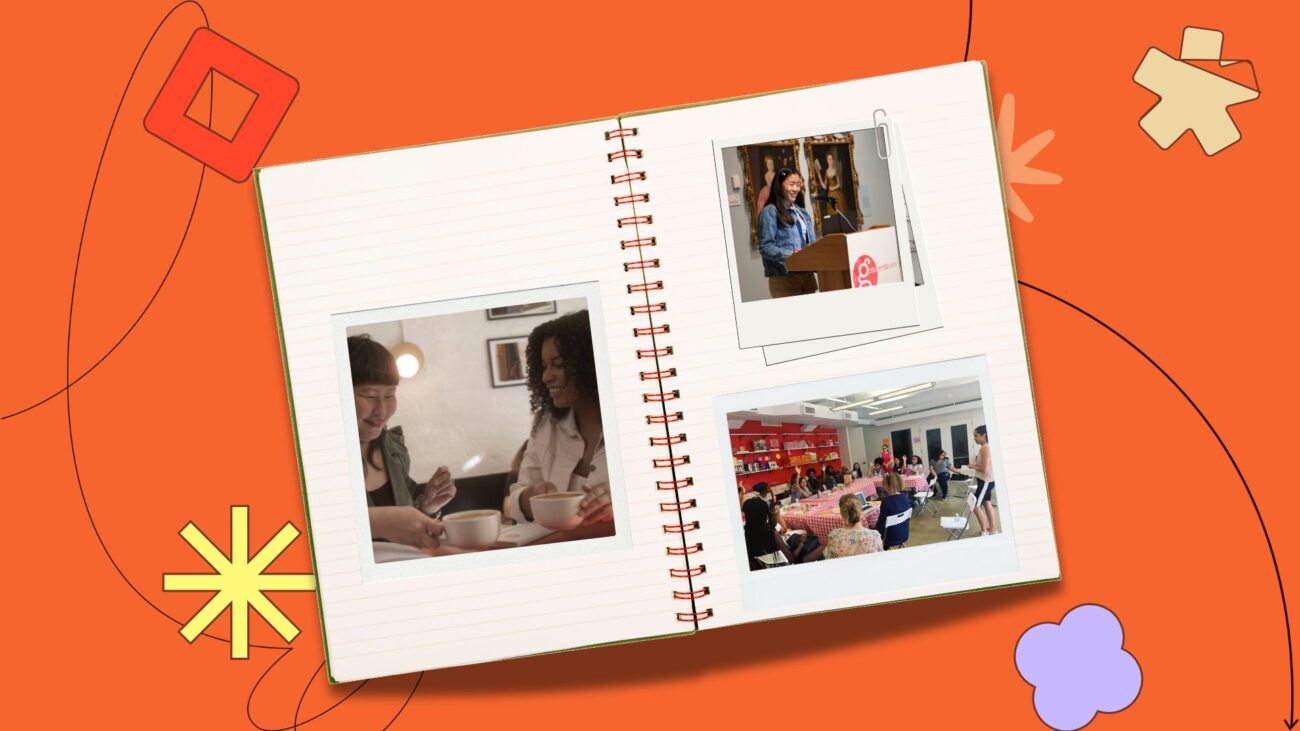Girls Write Now is a nationally award-winning nonprofit, media incubator, and multi-generational community. For nearly three decades, we have broken down the barriers of gender, age, race, and poverty to mentor, teach, and connect writers and leaders across disciplines and around the nation. With a focus on those historically disempowered due to their gender and gender identity, we harness the power of stories to shape culture, impact industries, and bridge worlds.

Become a Mentor
Make Time.
It feels like there’s never enough time in the day, and that feeling only grows as we get older. But did you know that when you mentor at Girls Write Now, you get time back? Our community gives you more than you could ever imagine, including a new sense of how to live and give your best life.

Original Multimedia

“How Did I Get Here?” is a podcast about the different stories of women in media and their career journeys. This episode highlights Lucy King, an Emmy award-winning documentary producer who started out in neuroscience.

A riddle in the form of a poem and an answer in the form of flash fiction.

This website encourages audiences to participate in my latest musical, Apartment 3B. It guides them through different methods of supporting the project and engaging actors, musicians, and theater people of all types alongside digital audiences.

“All Lives Matter” is a collaborative protest poem that takes both formal poetic writing techniques and a sample of an informative article to express the detriment of using the phrase, “all lives matter.”

This is a reflection and critique of Taylor Swift’s documentary Miss Americana.
'How Did I Get Here?' – Episode 1: Lucy King
"How Did I Get Here?" is a podcast about the different stories of women in media and their career journeys. This episode highlights Lucy King, an Emmy award-winning documentary producer who started out in neuroscience.
'Twas Not The Angel On My Shoulder
A riddle in the form of a poem and an answer in the form of flash fiction.
‘Apartment 3B’ Pocket Musical Website
This website encourages audiences to participate in my latest musical, Apartment 3B. It guides them through different methods of supporting the project and engaging actors, musicians, and theater people of all types alongside digital audiences.
‘ALL LIVES MATTER’
“All Lives Matter” is a collaborative protest poem that takes both formal poetic writing techniques and a sample of an informative article to express the detriment of using the phrase, “all lives matter.”
‘Miss Americana’ Review
This is a reflection and critique of Taylor Swift’s documentary Miss Americana.
In The News

Girls Write Now’s 2022 TBR List: Book Picks From Our Community
Sometimes the most challenging part about reading is actually deciding what to read next. Girls Write Now has asked our bookworm friends to share their To Be Read list! Take a look around and maybe add a title or two to your 2022 reading list.
Girls Write Now
3 Jan 2022

Esther Omolola Receives Women’s Media Group Scholarship
Women’s Media Group (WMG), a NYC-based nonprofit association of women leaders in media and publishing, has awarded one $2,000 scholarship to Girls Write Now mentee Esther Omolola.
Girls Write Now
28 Oct 2024

Mentee Ayah Al-Masyabi Publishes Opinion Piece on Voting in The Colorado Sun
Girls Write Now mentee Ayah Al-Masyabi recently had an opinion piece about voting published in The Colorado Sun.
Girls Write Now
23 Oct 2024

Book Riot Features Here & Now: Girls Write Now 2024 Anthology
In a list highlighting new releases for Book Riot, Girls Write Now mentor Erica Ezeifedi praised Here & Now: the Girls Write Now 2024 Anthology, saying “If you’d like to see the future of writing, and help an amazing nonprofit, I highly recommend getting a copy.” Ezeifedi has been a mentor at Girls Write Now for two years, during which time she has experienced the incredible talent of the young writers in the community. "In every workshop I’ve done since starting with the organization a couple years ago, I’ve been blown away with the level of writing coming from high schoolers."
Girls Write Now
29 Aug 2024

Girls Write Now Partners with NBCUniversal & Reel Works for PSA as Part of Creative Impact Lab
Girls Write Now recently partnered with NBCUniversal and Reel Works as part of their Creative Impact Lab for a commercial.
Girls Write Now
28 Mar 2024

Mentee Madeline Berberian-Hutchinson Interviewed on Book Riot Podcast
Book Riot Editor and Girls Write Now mentor Erica Ezeifedi invited mentee and NYS Poet Laureate Finalist Madeline Berberian-Hutchinson onto Book Riot's young adult podcast, "Hey YA" to talk about her journey as a writer and to recommend books for young adults interested in poetry.
Girls Write Now
23 Oct 2024

Abbi Jacobson Talks with Girls Write Now About Prelude Fellowship
Girls Write Now honoree and longtime champion Abbi Jacobson recently spoke with Girls Write Now about her new initiative, the Prelude Fellowship. Applications are due November 10!
Girls Write Now
29 Oct 2024

Rupi Kaur Shouts Out Girls Write Now on The Kelly Clarkson Show for International Day of the Girl
Poet and Girls Write Now Honoree Alum Rupi Kaur gave Girls Write Now a shout out on the Kelly Clarkson Show in honor of International Day of the Girl.
Girls Write Now
11 Oct 2024
Become a Mentor
Wondering, What Can I Do?!!
It’s a question we all ask ourselves these days. Well, Girls Write Now has the answer. Embark on a Journey that will speak truth to power—and ensure the power to speak truth is in good hands.

Corporate Partners
Authors & Leaders
Community Experiences
Upcoming Events
Upcoming Events
Join us on Thursday, April 3 at 7 PM ET for a panel discussion featuring admissions counselors from Tufts University and Wesleyan University. They'll share valuable insights on QuestBridge and the powerful impact these programs have on students’ success.








